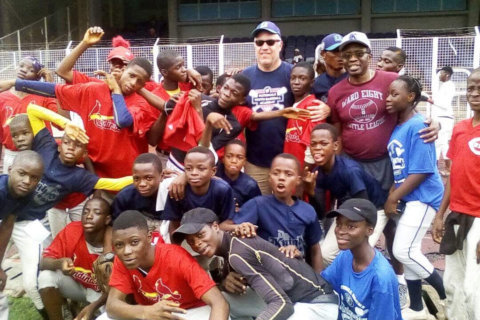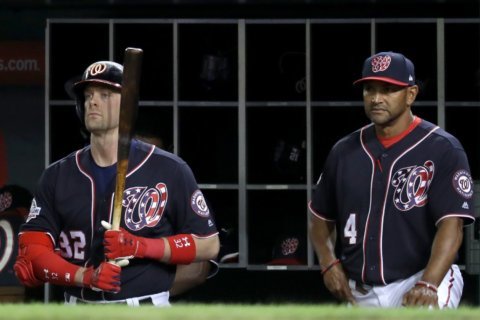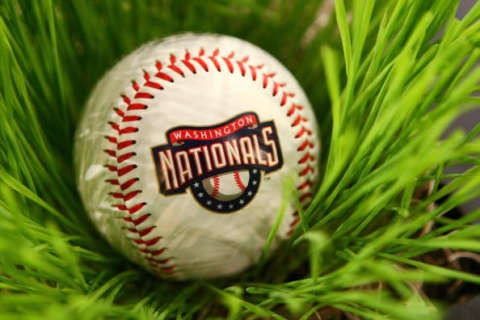WASHINGTON — On Monday night, the Nationals closed April the same way they opened it — with a second straight win, finishing one series and starting the next. That, of course, is the good news. The more troubling numbers include basically everything else to this point in a season that hasn’t been disastrous, but presents a lot more challenges entering May than many might have expected on Opening Day.
Even after these latest two wins, the Nats have the worst home record in the National League other than the Padres at 5-9. They’re 13-16 overall, 5.5 games out, in fourth place. Anthony Rendon is dinged up, Adam Eaton is back on the disabled list, and Daniel Murphy is not back yet from offseason knee surgery. As such, it’s not a surprise the offense has sputtered at times — the club has scored three runs or fewer 15 times, more than half their games. Getting those bats back should help a team that’s hovered in the middle third of the league in most offensive categories (12th in HR, 14th in OPS, 15th in WRC+) thus far.
There’s reason for hope, as well. Washington leads the majors in both walks and stolen bases. They have the ability to create run-scoring opportunities even when the lineup isn’t at full strength. The issue, thus far, has been cashing in on those chances. In late and close situations — defined by Baseball Reference as plate appearances in the 7th inning or later with the batting team tied, ahead by one, or the tying run at least on deck — the Nats are slashing just .181/.282/.275 as a team through Sunday. In 174 such plate appearances, they had just nine extra-base hits and 47 strikeouts. These numbers should correct themselves toward the mean — a largely similar offense slashed .231/.313/.405 in the same situations last year.
There have also been the expected growing pains of a manager new not just to this team, but to the role. Davey Martinez has made a couple, well, rookie mistakes that have hurt his team’s chances. Late Saturday afternoon, as the game against the Diamondbacks dragged into extra innings, Martinez saw a potential pinch-hitter in the on-deck circle and preemptively went to his bullpen for Austin Adams, only to have Arizona leave scheduled batter Jarrod Dyson in the game to hit. Dyson walked, as did the next hitter, A.J. Pollack, forcing in what would end up being the winning run. More broadly, Martinez hasn’t found a way to protect his star hitter in Bryce Harper, who has drawn an astounding 38 walks already. That puts Harper on pace for the second-highest walk total in Major League history, trailing only Barry Bonds’s preposterous 2004 season.
Perhaps the biggest issue moving forward is that the National League has more contenders than expected, especially within the NL East. The division has been consistently at or near the bottom in Major League Baseball over the last few seasons, providing easy wins for the Nats, particularly after the July 31 nonwaiver trade deadline when useful parts are shipped off to contenders. But this year figures to be different. The first truly easy stretch of schedule doesn’t begin until the Padres come to town May 21, followed by a road trip to Miami and Baltimore. The dog days could provide some tough tests.
Amid the division play in August, the Nats have to travel for seven straight at the Cubs and Cardinals, then draw both those clubs again along with the Brewers and Rockies in September. There’s a chance all of those will be meaningful games, and that most (if not all) of the non-Miami NL East games will be as well.
But at least the Nats aren’t the Dodgers. Los Angeles is also mired in fourth place, but staring up at two 2017 playoff teams and coming to terms with losing its All-Star shortstop for the season. LA’s bullpen has also taken a big step back, an area the Nats are stronger at this point of the year than they’ve been in several seasons. Yes, they ranked 25th in ERA at 4.91, but both their FIP (3.83) and xFIP (3.24) suggest better days are ahead. They got a key six outs from Ryan Madson and Brandon Kintzler to lock up a 3-2 win over the Pittsburgh Pirates Monday night with Sean Doolittle unavailable.
That was the first one-run game Washington has won since April 1, having lost eight straight one-run affairs since. That’s more of the kind of bad luck that also ought to average itself out over the course of the season. A lot of the early-season anomalies we’ve seen thus far should smooth out over the course of 162 games. But they won’t come automatically, and the longer division rivals stay in the hunt, the harder those needed wins will be late in the summer.







